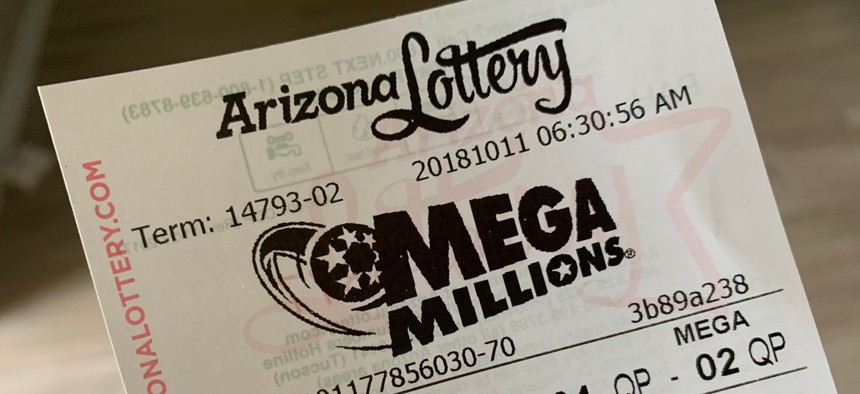Why All Lotteries Are Based on a Lie

A Mega Millions lottery ticket. Shutterstock
Even if you win the $1.6 billion, you don't really get $1.6 billion.
A ginormous lottery jackpot can inspire more fantasies than a thousand copies of Fifty Shades of Grey. The Mega Millions lottery advertises a $1.6 billion jackpot, the highest ever. But even if you win (and you probably won’t) you won’t ever get $1.6 billion, or not really.
The $1.6 billion is the amount you’d get if you take an annuity. The lump-sum payout is a more modest $904 million, almost $80 million less than a 2016 Powerball payout, despite claims of this being a record jackpot. As Josh Barro points out in New York magazine, our fantasies about lottery winning must be tempered by the cruel realities of interest-rate risk. So as the price of an annuity falls with interest rates, Mega Millions can provide that $1.6 billion for a smaller upfront payment. Income streams vary with interest rates. Even if you don’t win the lottery, you’ll face the same risk financing your retirement.
Barro—and I—argue you should take the annuity, not the lump sum. Mega Millions, which pools different state lotteries, finances lottery payments in New York by buying U.S. Treasury bonds that mature as each payment is due. This puts the investment risk on Mega Millions (assuming they don’t default on you), and there are big tax advantages because you receive smaller payments over time rather than one big payment at once. There is also evidence that lottery winners who take their winnings in smaller payments over time are happier.
But even if you take the annuity you don’t really get $1.6 billion. The jackpot is not adjusted for inflation. If you take the annuity, you get payments for 30 years that grow by 5% each year. The first payment is the smallest, about $25 million, and largest payment will be the last one, about $100 million. But after adjusting for 30 years of inflation, the value will be more like $56 million. Therefore, the $1.6 billion is really only $1.1 billion after accounting for inflation–and if inflation is higher–say 3%—it is only $976 million! And of course, that’s before taxes. Your winnings are subject to the highest income rate (unless you’re lucky enough to live in a state that doesn’t tax lottery winnings).
The cost of inflation would lead some financial advisors to argue you should take the lump sum. After all, you can invest it yourself in speculative assets that can beat inflation. But this means you also risk bad markets, ill-advised investments, unscrupulous money managers, greedy relatives, and your own worst instincts. Another alternative is buying an inflation-adjusted 30-year annuity (assuming an insurance company would sell one this large) and resign yourself to $40 million payments each year (the annuity $900 million buys you). This may seem like a better strategy, but you’d have a bigger tax bill, since you have to pay taxes on the lump sum and the income payments.
It seems there are no good options and unless you take on lots of risk, you’ll never see all of the $1.6 billion. At least not if you play the lottery.
Allison Schrager is a writer for Quartz, where this article was originally published.
NEXT STORY: Kids Aren't Getting Much Exercise





